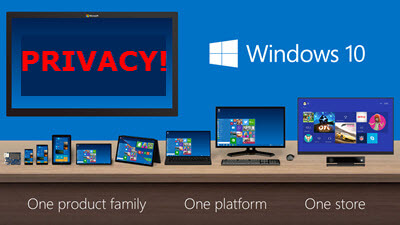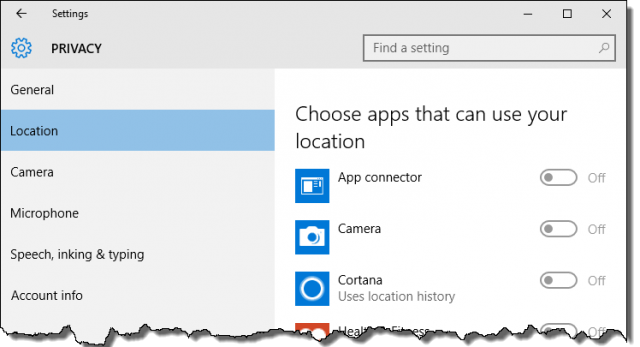For the most part, Windows 10 appears to have been quite well received among users. Undoubtedly, one of the the main bones of contention has been regarding the data collection and associated privacy issues, but how bad is it really? I mean, who cares if Microsoft knows that some old bloke in Queensland visits the DCT site 25 times per day?
Microsoft Ecosystem vs Apple Ecosystem
 My wife and I both own an iPad. Mine mostly sits gathering dust but my wife uses hers extensively. She loves the games in particular. The Apple apps almost always include a set of “permissions” that the user must agree to, granting access to certain information which is often quite sensitive. I have never seen where these apps explain exactly why they need to access this information, nor what they are using the information for. Yet, this has been going on for years with nobody seemingly raising an eyebrow.
My wife and I both own an iPad. Mine mostly sits gathering dust but my wife uses hers extensively. She loves the games in particular. The Apple apps almost always include a set of “permissions” that the user must agree to, granting access to certain information which is often quite sensitive. I have never seen where these apps explain exactly why they need to access this information, nor what they are using the information for. Yet, this has been going on for years with nobody seemingly raising an eyebrow.
Little wonder then that Microsoft thought they could get away with doing more or less the same thing. What they didn’t factor in, however, was that the Windows desktop user is often a whole different animal to a tablet user.
The times they are a changin’
 The perceived “privacy issues” in Win 10 have certainly created a talking point and it’s no coincidence that tech writers are also divided on the subject, some joining the conspiracy theorists in condemning Microsoft while others take a more pragmatic point of view. Indeed, I recently came across 2 separate articles emanating from colleagues writing for the same organization with each expressing polar opposite opinions on the matter.
The perceived “privacy issues” in Win 10 have certainly created a talking point and it’s no coincidence that tech writers are also divided on the subject, some joining the conspiracy theorists in condemning Microsoft while others take a more pragmatic point of view. Indeed, I recently came across 2 separate articles emanating from colleagues writing for the same organization with each expressing polar opposite opinions on the matter.
Overall though, as far as tech writer’s are concerned, I’m seeing a decided shift to the “mountain out of a molehill” side of the debate. On the other hand, once it starts rolling, the bandwagon effect pretty much ensures that many potential users’ minds will be difficult to change. Then, of course, there will always be a percentage of users who adamantly proclaim that Microsoft is up to no good, no matter what.
What many do not realize is that telemetry has been part and parcel of the Windows experience from as far back as XP. Of course, the level of data collection has widened and increased exponentially with each new Windows version but I see that as just keeping up with the times, progress. The fact of the matter is, although we diehards will always love our desktops, mobile computing is all the rage these days, and telemetry and mobile computing simply go hand in hand. As the classic ‘Love and Marriage’ song says… you can’t have one without the other.
What would happen, for example, if you asked Cortana to find the nearest Pizza shop but the digital assistant has no idea where you are located? Don’t want to use Cortana or have the digital assistant collecting data? Simple, just switch it off! And so on, and so on.
Bottom Line
As far as I am concerned, to say that Microsoft is ‘spying’ on consumers is a pretty far stretch. Remember, telemetry and mobile go hand in hand, if you don’t need the apps, don’t want to use these services, just turn them off.
- Further reading here: Understanding Windows 10 – More Tips to Help Get You Started
By the way: I’m much more concerned over the force-fed updates in Windows 10 than anything to do with telemetry. While I can appreciate the rationale behind the decision, it’s inequitable to encompass all users in a policy which clearly impinges on the fundamental right to freedom of choice.


I agree with you on both counts. I, too am more concerned over the force-feeding of updates than I am over the supposed spying that W10 does. If you have a smartphone, you are tracked, period. W10 is no worse than any of the other OS’s out there. I am just waiting for the first “cumulative update” disaster that is guaranteed to occur with the current policy. I personally have had the large November update completely brick a Winbook tablet that I had no option to prevent. A clean install was necessary to get back to a usable computer. Luckily, I know how to do this, but can you imagine all the users out there who just throw away their computers in frustration after a failed update or upgrade? A very misguided policy as far as I am concerned. There should at least be a choice, with the standard update path as the default, but an option to choose to update and choose which ones. Shame on MS!!
I agree with you on this Jim. If you do not want them to collect your info then turn off that app. No matter what in this day and age it is hard not to be tracked by some sort of device. What people need to do is pay attention and be informed. use what you feel comfortable with. The luxury of technology comes with a price. Great article!
Wow, dude, you need a hug from someone. Maybe if you come out of your mamma’s basement long enough to realize that we are just voicing our opinions. Your anger is unwarranted. Maybe just try a little respect instead of spewing anger and inaccurate data at people. It’s a shame that one cannot voice an opinion anymore without the haters and the crazies coming out of the woodwork! Grow up.
@bnjohanson – Everybody is welcome to express an opinion here, all we ask is that they do so in a respectful and civil manner. If you’re unable to get your point across without having to resort to rudeness and insults, kindly refrain from commenting at all.
You can’t turn them off, MS have admitted that the OS automatically turns them back on after a certain period of time, it’s in the terms.
If you’re referring to the apps, that’s not correct Bob. I’ve been running Win10 Insider for months and Win 10 proper ever since it was first released. All apps that I turned off remain turned off, in both.
Please provide some sort of reference point.